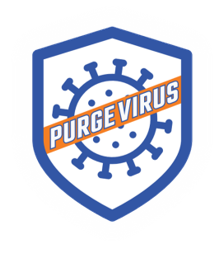- 13 reads

Purge Virus is pleased to provide these indoor air quality (IAQ Services) to help reduce the spread of COVID-19 during the pandemic and help increase safety and productivity for years to come beyond COVID-19 for businesses in Iowa.
Allergens, chemicals, and volatile organic compounds are all around us from products we buy to furniture and interior finishes. With many workplace environments that have closed windows and central HVAC systems, we are vulnerable to “Sick Building Syndrome” (SBS). According to ASHRAE, the estimated productivity decrement caused by SBS symptoms has an annual cost of $60 billion. A 20-50% reduction in these symptoms, considered feasible and practical, would bring annual economic benefits of $10 billion to $30 billion.
Clean Indoor Air = Safety and Savings
ASHRAE Estimated potential productivity gains from improvements in indoor environments.
Reduced respiratory illness: 16 to 37 million avoided cases of common cold or influenza: $6 – $14 billion
Reduced allergies and asthma: 8% to 25% decrease in symptoms within 53 million allergy sufferers and 16 million asthmatics: $1 – $4 billion
Reduced sick building syndrome symptoms: 20% to 50% reduction in SBS health symptoms experienced frequently at work by approximately 15 million workers: $10 – $30 billion
Improved worker performance from changes in thermal environment and lighting (beyond SBS): $20 – $160 billion
IAQ Services offered by Purge Virus include IAQ Assessment, IAQ Site Visit, PTAC Units, Mini Split Systems, and Ceiling Cassettes. These services will help reduce the spread of COVID-19 and promote Indoor Air Quality for businesses in Iowa.
For more news on COVID-19 in Iowa: Iowa State University Approaches COVID-19 Using Nanotechnology
“An example of others is a vaccine being developed by the Nanovaccine Institute at Iowa State University (ISU). The vaccine will be able to be administered without needles and in one dose. It also won’t require refrigeration, which is a significant issue for both the Pfizer-BioNTech and Moderna vaccines. The Pfizer-BioNTech vaccine, in particular, requires temperatures as low as -94 degrees F, which has created demand for specialized freezers and shipping containers.
‘They’re going to get us through the pandemic, at least in terms of getting off the ground, getting back to some sort of normalcy, but they’re not perfect,’ said Balaji Narasimhan, director of the Nanovaccine Institute. ‘I can take the nanovaccine vial, put it on a shelf in front of me, come back in a year, pick it up and it’ll still work.’
The nanovaccine is administered via nasal inhalation. The institute received a $2 million federal CARES Act funding and is working with other global institutions on the vaccine. At the time they received the funding, Narasimhan said, ‘This approach exploits ISU’s strengths in nanovaccine platform technology and UI’s expertise in SARS (severe acute respiratory syndrome) virology, immunity, and unique animal models.’”

